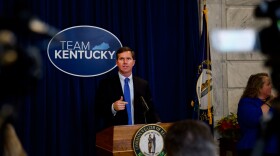Easing up on citywide anti-coronavirus measures too soon could lead to hundreds more deaths and hospitalizations, according to a new study from the University of Louisville and the city’s public health department released Monday.
To safely reopen Louisville this summer, the city will need to maintain current social distancing measures and add new rules related to testing, isolating and contact tracing. If restrictions loosen up too quickly, an additional 900 people could die and another 2,000 could be hospitalized, the study’s authors projected.
Louisville is increasing its contact tracing efforts, with about 55 staff for that job now and plans to add another 100 to 200.
The study’s model assumes the steps taken so far have decreased transmission of coronavirus by 65% to 70%. The authors wrote that relaxing the current restrictions wouldn’t allow the city to safely reopen by next month.
Transmission of the coronavirus seems to be tied to how much social distancing is practiced, said the study's co-author Seyed Karimi, an assistant professor at U of L's school of public health. He joined Mayor Greg Fischer's regular press briefing Monday to discuss the study.
Karimi said the model showed a major difference between cutting contacts by half, versus by 65% or 70%, as they estimate Louisville has done.
"On the face of it, not much difference, but the trajectory and the path would have been much different if we had decreased our contacts only by 50%," Karimi said. "We would have been on an unstable, uncontrollable path."
He said the first wave of the pandemic could end in August and Louisville could prevent a second wave if it is careful.
Fischer said it's important that people do not start to think the crisis is over and that it's time to go back to normal.
"A little bit of social distancing can really result in a huge difference in terms of the cases and deaths," Fischer said.
He said he prefers the slower, phased reopening proposed by Gov. Andy Beshear.
Complicating matters is the fact that Indiana entered its second phase of reopening the general economy on Monday. Kentucky is still in the first phase, allowing health providers to operate again, but Beshear has set target dates for other industries to reopen, starting with manufacturing, horse racing and others on May 11.
Last week, Louisville Mayor Greg Fischer said Indiana’s earlier reopening could cause problems for the city, given how many people go back and forth across the river for both work and recreation.
On Monday, Fischer said the study shows a need to proceed with caution. He has spoken with Southern Indiana government and business leaders and is hoping for more coordination this week, he said.
"We want to send a message that makes sense to people on both sides of the river," he said. "It would say things like, you know, don't rush to places like restaurants and malls until we can do it together."
The data suggest waiting a few weeks to reopen would be safer, Fischer said.
But the study's authors wrote that such a gradual approach may not be needed for Louisville's hospitals. Rather, they said that all but 400 of Louisville's more than 3,600 hospital beds could be released for treating patients who don't have COVID-19. They said patients should be tested for coronavirus before admission.
This would have general health benefits, and help the economy, they wrote.
Total deaths related to COVID-19 in Louisville crossed 100 Monday, with four additional deaths making the new total 102, Fischer announced, calling it a "tragic milestone." He said overall cases reached 1,421, including nine new confirmed cases. The recovery rate has grown to about 54%, up from about half last week.
The mayor also said nearly 8,800 people have been tested in Louisville. Fifty Louisville residents are currently in the hospital, and about two-thirds of them are in the intensive care unit.






